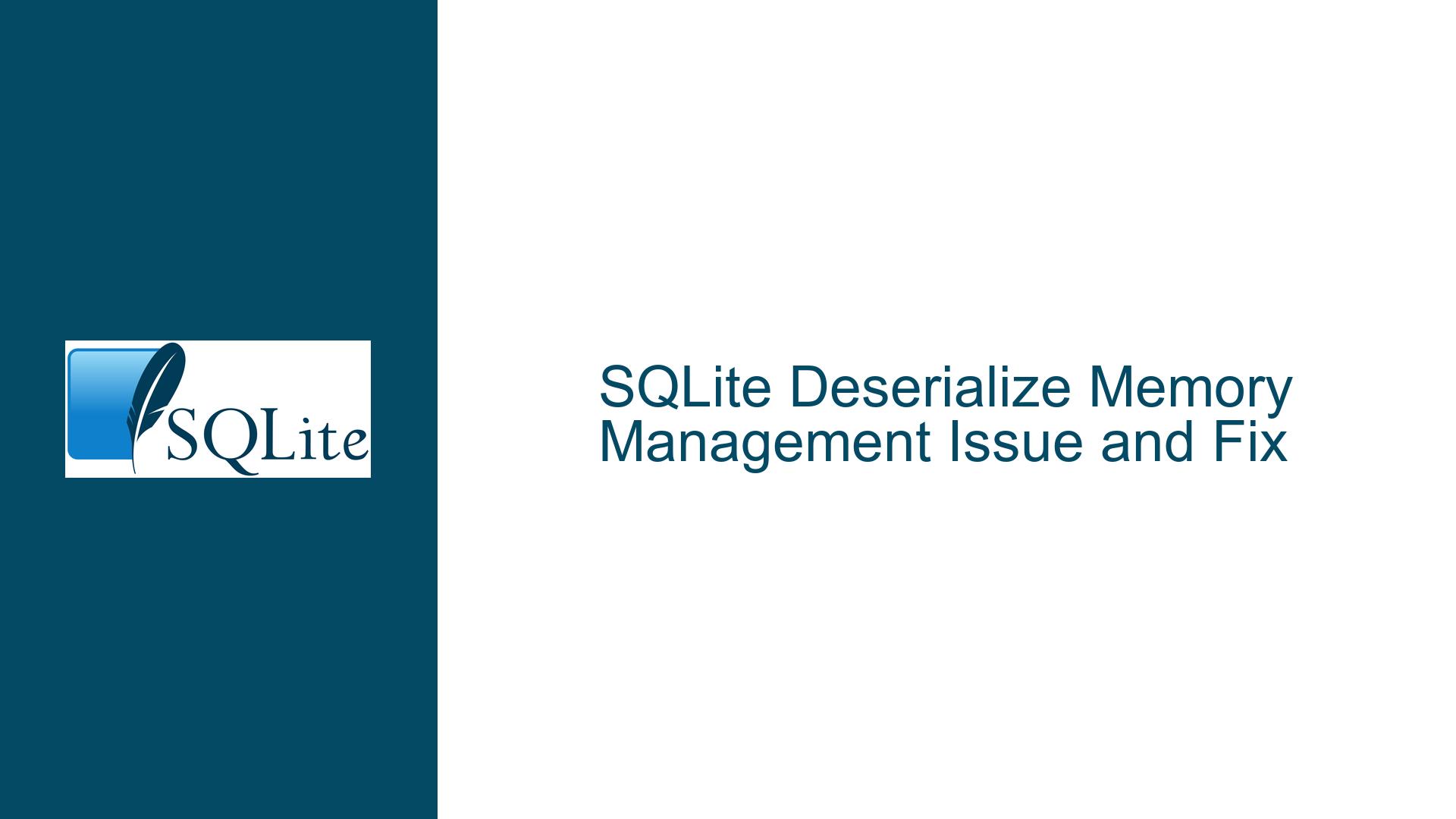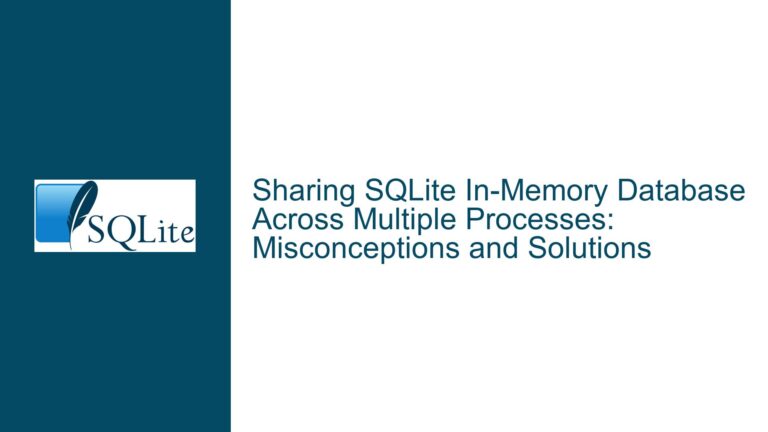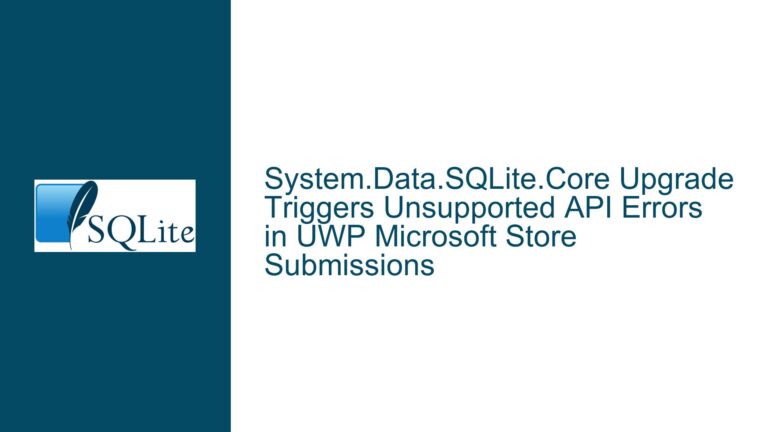SQLite Deserialize Memory Management Issue and Fix
SQLite Deserialize Function Fails to Free Memory on Error
The sqlite3_deserialize function in SQLite is designed to allow developers to load an in-memory database from a serialized byte array. This function is particularly useful for scenarios where databases need to be quickly loaded into memory without reading from disk. However, a critical issue was identified in the implementation of this function, specifically related to memory management when the function fails. According to the comment in the sqlite3.h header file, if the sqlite3_deserialize function fails and the SQLITE_DESERIALIZE_FREEONCLOSE bit is set in the flags argument, the memory block pointed to by the pData parameter should be freed using sqlite3_free(). This behavior is expected to prevent memory leaks in cases where the deserialization process does not complete successfully.
The issue arises because the implementation does not adhere to the documented behavior. The only usage of the pData pointer in the function is to assign it to the p->aData field just before a successful exit. This means that if the function fails at any point before this assignment, the memory block is not freed, even if the SQLITE_DESERIALIZE_FREEONCLOSE flag is set. This discrepancy between the documented behavior and the actual implementation can lead to memory leaks, especially in applications that rely heavily on in-memory databases and frequently use the sqlite3_deserialize function.
The implications of this issue are significant for applications that use the sqlite3_deserialize function in environments where memory resources are constrained. Memory leaks can accumulate over time, leading to increased memory usage and potentially causing the application to crash due to out-of-memory conditions. Additionally, this issue can complicate debugging efforts, as memory leaks are often difficult to trace and diagnose.
Interrupted Deserialization Leading to Memory Leaks
The root cause of this issue lies in the handling of the pData pointer during the deserialization process. When the sqlite3_deserialize function is called, it performs several steps to initialize the in-memory database from the serialized byte array. These steps include validating the input parameters, allocating memory for the database structure, and copying the serialized data into the appropriate memory locations. If any of these steps fail, the function is expected to clean up any allocated resources, including freeing the pData memory block if the SQLITE_DESERIALIZE_FREEONCLOSE flag is set.
However, the current implementation does not include the necessary cleanup code to free the pData memory block in the event of a failure. This oversight can occur in several scenarios, such as when the input parameters are invalid, when memory allocation fails, or when the serialized data is corrupted and cannot be properly deserialized. In each of these cases, the function exits without freeing the pData memory block, leading to a memory leak.
The SQLITE_DESERIALIZE_FREEONCLOSE flag is intended to provide a mechanism for automatic memory management, ensuring that the memory block is freed when it is no longer needed. This is particularly important in applications that use the sqlite3_deserialize function to load multiple databases into memory, as the memory usage can quickly grow if the memory blocks are not properly freed. The failure to implement this behavior as documented undermines the reliability of the sqlite3_deserialize function and can lead to unpredictable behavior in applications that depend on it.
Implementing Proper Memory Cleanup in sqlite3_deserialize
To address this issue, the implementation of the sqlite3_deserialize function must be modified to ensure that the pData memory block is freed in the event of a failure, as specified in the documentation. This involves adding cleanup code to the function that checks the SQLITE_DESERIALIZE_FREEONCLOSE flag and frees the pData memory block if the flag is set and the function is about to return an error.
The fix involves the following steps:
Error Handling and Cleanup Code: The function should be modified to include error handling code that checks for the
SQLITE_DESERIALIZE_FREEONCLOSEflag and frees thepDatamemory block if the flag is set. This cleanup code should be executed before the function returns an error, ensuring that the memory block is freed in all failure scenarios.Testing and Validation: The modified function should be thoroughly tested to ensure that it behaves as expected in all scenarios, including cases where the input parameters are invalid, memory allocation fails, or the serialized data is corrupted. This testing should include both unit tests and integration tests to verify that the memory management behavior is correct and that no memory leaks occur.
Documentation Updates: The documentation for the
sqlite3_deserializefunction should be updated to reflect the corrected behavior, ensuring that developers are aware of the memory management requirements and can use the function correctly in their applications.
The following table summarizes the key changes required to fix the issue:
| Step | Description |
|---|---|
| Add Error Handling Code | Modify the function to include cleanup code that frees pData on failure. |
| Test Modified Function | Perform thorough testing to ensure correct memory management behavior. |
| Update Documentation | Update the documentation to reflect the corrected behavior of the function. |
By implementing these changes, the sqlite3_deserialize function will adhere to the documented behavior, ensuring that the pData memory block is properly freed in the event of a failure. This will prevent memory leaks and improve the reliability of applications that use the sqlite3_deserialize function to load in-memory databases.
In addition to the specific fix for this issue, developers should also consider the following best practices when using the sqlite3_deserialize function:
Check Return Values: Always check the return value of the
sqlite3_deserializefunction to ensure that the deserialization process was successful. If the function returns an error, handle it appropriately and avoid using the database object that was passed to the function.Use Appropriate Flags: When calling the
sqlite3_deserializefunction, use theSQLITE_DESERIALIZE_FREEONCLOSEflag if the memory block should be automatically freed when the database is closed. This ensures that the memory management behavior is consistent with the application’s requirements.Monitor Memory Usage: In applications that use the
sqlite3_deserializefunction frequently, monitor memory usage to detect any potential memory leaks. Use tools such as Valgrind or AddressSanitizer to identify and diagnose memory management issues.
By following these best practices and applying the fix for the sqlite3_deserialize memory management issue, developers can ensure that their applications using SQLite in-memory databases are robust, reliable, and free from memory leaks.






